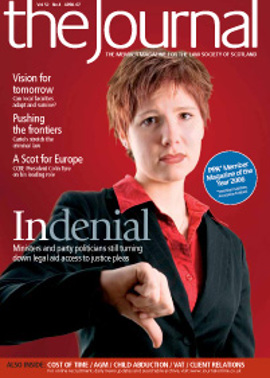Local roots

As the profession prepares for life under a changed landscape, shaped by the Legal Profession and Legal Aid (Scotland) Act and the post-Clementi order, the collegiality provided by the ancient faculties may never be so welcome.
Whether serving as a forum to discuss pressing issues, a vehicle for CPD, or the opportunity to socialise with others in the profession, the faculties have traditionally been the site where the temperature of the profession at its grass roots can most accurately be taken.
Yet, many faculties report dwindling member numbers, or at least a difficulty in finding the next generation of office bearers.
With the bulk of trainees and newly qualifieds corralled into city firms with their own libraries, CPD arrangements and peer support, and the majority being female and perhaps less attracted by faculty traditions such as golf days, it could be that these revered institutions face a fight to remain relevant.
Still relevant
Hilary Eldridge, Dean of the North East Fife Faculty, admits that larger firms are able to exert their influence without requiring faculty support, but hopes that faculties are adaptable enough to embrace issues affecting all solicitors. Similarly, Andrew Robertson, Dean of the Greenock Faculty of Solicitors, believes that faculties ought to be more relevant than ever in view of the new challenges facing the profession, “except perhaps the very large commercial firms acting for a limited number of clients, where they are really close to being ‘in house’ solicitors”.
Dean of the Royal Faculty of Procurators in Glasgow, Michael Samuel, reports an organisation in rude health. With 212 member firms representing 1,400 individuals, and having recently hosted a sell-out dinner at the refurbished Kelvingrove Art Gallery, Samuel believes the RFPG remains as relevant today as ever. In addition to offering members access to its comprehensive library, the RFPG strives to remain pertinent by entering into the debate over the crucial issues of the day, providing a standard missive, and running a website (www.rfpg.org) including a recruitment section.
In Dundee, present Dean George Donnelly says the local faculty is well supported by large firms like Blackadders and Thorntons. Likewise Alastair Dorward, Dean of the Perth faculty, but speaking in a personal capacity, says there is no reason for faculties not to have broad appeal.
“Based upon my experience I believe local faculties remain relevant in the modern profession as a means of collating opinion and representing or lobbying on local and national issues. Within the past 12 months, the Perth faculty structure has allowed a corporate position to be taken rapidly on such matters as criminal legal aid fees and the proposed Scottish Bar Association, and was instrumental in raising the issues surrounding the Legal Profession Bill and securing a raft of individual responses during the consultation period.
“The role of representation on a collegiate or corporate basis should be relevant to all firms, irrespective of size. There is undoubtedly a great diversity of activity and a significant variation in size of firms even locally. There appears to be less opportunity today for interaction between firms in discussing matters of common interest, and the presence of a local faculty facilitates this.”
Diverse roles
In common with other faculties, the main focus in North East Fife is in providing social opportunities (in their case an annual dinner, cricket match and golf outing), maintaining the local library, and arranging seminars and training. Likewise, secretary of the Faculty of Procurators of Caithness, Stephen Copinger, reports that their main role is organising the annual CPD event where instead of everyone having to travel for individual events, speakers come to Caithness for the day.
Beyond that remit, in Greenock, Andrew Robertson views the faculty’s main role as being to “keep members advised of current developments and challenges, particularly as this faculty does not have a Council representative”. Also, he says, “our job is to provide a degree of cohesion in a very competitive environment”.
The benefits of an active faculty have been felt in Perth, according to Alastair Dorward, in initiatives such as the creation of “a very healthy property centre”, which has now been hived off as a separate enterprise. A current initiative is the promotion of standard residential missives. Meanwhile in Dundee, in addition to the social and training role, there is a strong element of advising and guiding practitioners with queries in relation to professional and ethical difficulties, and supporting when, for example, one member was recently threatened with being found in contempt of court.
Part of the union?
As faculties evolve and adapt to the changing demands of their members, could they have a role, say, offering counselling services to solicitors facing an anticipated increase in complaints, or will they become more akin to local trade unions – a perception perhaps enhanced by the Glasgow Bar Association’s stance on block criminal legal aid fees last year?
Hilary Eldridge does not foresee her faculty adopting any role which would involve counselling or representing solicitors facing complaints; nor does she think the faculty will ever be perceived as a local lawyers’ trade union.
“We face completely different difficulties. There are only four solicitors available to operate the duty legal aid scheme for criminal business. One has his main place of business in Kirkcaldy and would probably have represented his views through the Kirkcaldy faculty. If we had been asked to vote on withdrawal of service, consultation would have taken place amongst the three solicitors locally based and a view taken. I am in no doubt however that there would have been a marked reluctance to withdraw services even though there was support for the stance taken.”
Andrew Robertson, on the other hand, can see faculties offering assistance with IPS complaints. “It is always easier to tell someone else what they should do than to take the advice yourself.” But like Eldridge he does not think the faculty regards itself as a local trade union.
“Nevertheless I am sure that the members realise that if they wish to challenge the Executive on any ground, they need to do so as a united front. Our faculty’s view of the GBA’s stance was generally supportive and I think that a vote to join in withdrawal of services would probably have been carried.”
Local culture
Alison Marshall, Dean of the Roxburghshire Faculty, considers there is a perception that the faculty is viewed to an extent as a local trade union. “The stance taken by Glasgow – and repeated throughout the country – enabled the profession to work together and to be united in its approach. From a local point of view a vote was taken here, and we were in agreement with the Glasgow position and were prepared to adopt the same stance. With the decision being taken by the faculty as a whole, it meant any protest should have been effective.”
In Caithness, a slightly different culture persists, says Stephen Copinger. “There is certainly not a general perception of the faculty as a trade union, although there is a belief among some members that perhaps it should be.
“There is however a strong Caithness tradition, for good or ill, of not organising together but each farm, croft or business doing its own thing, without getting tangled up with the neighbours – this tradition is well represented among our faculty members.” The legal aid issue, he adds, was intimated to the faculty but fairly academically as only one firm in the county is registered to provide criminal legal aid, or taking on new legal aid work of any type.
Adapt and survive
Michael Samuel believes Glasgow will remain as a local forum rather than a trade union, but admits the RFPG “cannot afford to rest on its laurels and will have to keep providing something new to its membership, to be at the vanguard of change and to pay its way”. Dundee too expects to offer a more proactive service to members by assisting them with the anticipated increase in complaints. George Donnelly also feels that among younger members there is a perception that the faculty should be like a trade union, and reports that the GBA stance was widely supported.
Down the road in Perth, Alastair Dorward says the future role of faculties will depend on the role adopted by the Society, particularly as the profession retreats from self-regulation.
“Faculties will always be a conduit for rapid opinion taking and lobbying, but whether they do so under the leadership of a Society able to move towards the primary role of representing the profession remains to be seen. I do not believe that Perth Faculty would be in a position to offer representation or counselling to solicitors facing complaints under the new legislation. I think that this is an initiative which might be better considered by the Society for implementing nationally.”
The next generation
Yet for the faculties to remain vigorous, finding the next generation of standard bearers is a critical issue. Hilary Eldridge reports this to be a “perennial problem”, solved – in part – by “the same old faces soldiering on for years at a time”. In Roxburghshire, Alison Marshall says the perception is that office bearers should be court practitioners, which inevitably limits the pool to draw from. In Glasgow, Michael Samuel says firms sometimes discourage young people from getting involved. Only Alastair Dorward in Perth reported no present or anticipated problems in attracting office bearers.
Despite this, the feeling persists that the faculties are robust and will find ways of reinventing themselves to remain germane for the next generation.
Roger Mackenzie is a solicitor and a former deputy editor of the Journal
MANY VOICES, SHARED ISSUES
Across the faculties, two main issues are vexing members – the Legal Profession Act and legal aid fees.In Greenock, Andrew Robertson fears that the effect of substantial penalties for inadequate professional service complaints could easily put some of the smaller firms in the area out of business. As Dundee’s George Donnelly puts it, “the concern is we have a Scottish Executive which looks upon the legal profession as an enemy rather than a profession who ought to be consulted and co-operated with”.
Alison Marshall says pessimism prevails in Roxburghshire in regard to legal aid fees. The feeling is that not only do the fees undervalue the work done, but ultimately the profession will never be successful in obtaining adequate increases.
Both North East Fife and Caithness report difficulties in attracting newly qualified solicitors to work. In Caithness this vacuum in succession planning extends, says Stephen Copinger, to a concern about making adequate provision for retirement. “Profit margins are well down from early practice days, and the potential revenue from the sale of a share of a firm no longer holds the guaranteed return it may once have.”
In this issue
- The bigger picture
- Citizen justice
- Purely rhetoric?
- Purely rhetoric? (1)
- Profit, team by team
- Bring them home
- Bring them home (1)
- Local roots
- Wanted! (for conspiracy)
- One voice
- AGM report
- Dealing positively with client concerns
- Block fees: the story behind the changes
- Think before you charge
- For the high jump
- Jury questions
- Put to the test
- Yet another expense
- Planning with people
- Lifting the lid
- Website reviews
- Book reviews
- Home is where the heart is
- PSG - new certificate of title
- SEPA: apply online and save
- SEPA: apply online and save (1)






